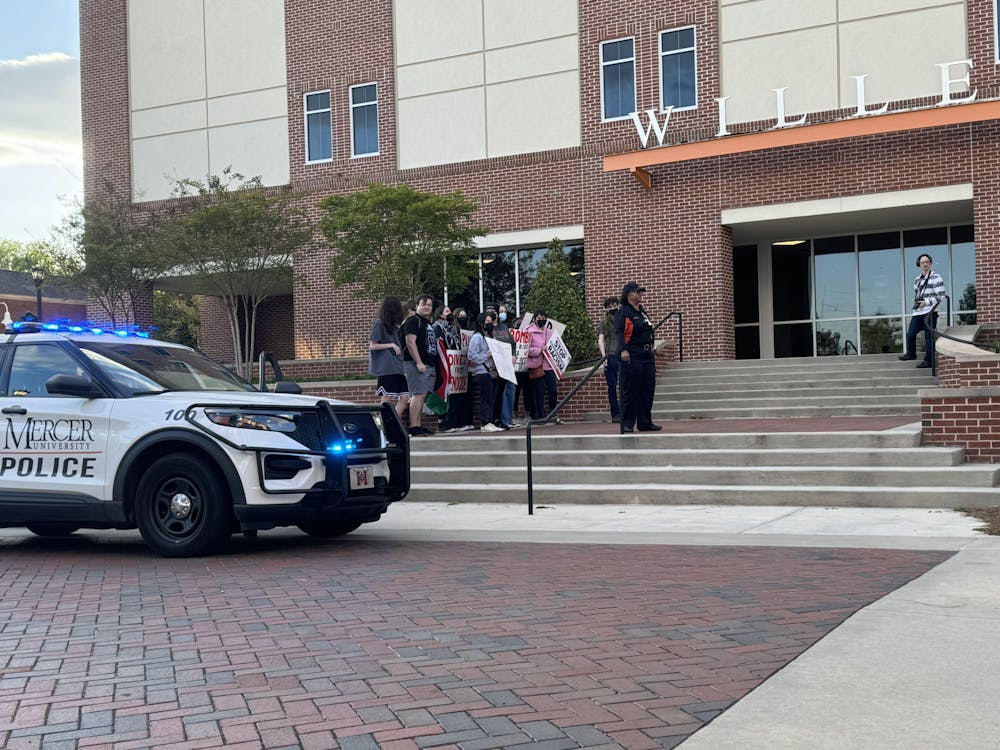Since Oct. 7, citizens concerned about the conflict between Israel and Palestine have been protesting the responses of government bodies, political parties, corporations and academic institutions. Recently, students took to Mercer's campus to protest, among other things, guest lecturer Jennifer Grossman, who was invited to teach an extra credit lecture for students for the Center for the Study of Economics and Liberty (CSEL).
In response to the university's address of the protest and arrest of a student following the interruption of the guest lecture hosted by Mercer's CSEL and Mercer Turning Point USA (TPUSA), students who addressed SGA two weeks ago have organized a demonstration for 11 a.m. on Wednesday on Cruz Plaza.
As students at Mercer, Kennesaw and Emory protest alongside peers at other institutions, it appears as though the protestor arrests at Columbia are doing little to dissuade students from speaking out.
But as tensions between university administrations and students rise, and as administrations continue to call on law enforcement to disperse and arrest students, it is important to know what is allowed for protesting on college campuses.
The right to protest in American law falls under the protections of the First Amendment. The First Amendment is the first of the ten amendments that comprise the Bill of Rights, but it alone gives Americans the freedom of religion, speech, press, "peaceable" assembly and petition to the government for a "redress of grievances."
The combination of speech, peaceable assembly and petition are typically bundled into the American right to protest, a core part of the American identity.
Most colleges have begun or now have protest policies, something Mercer lacked on April 4, when two students were removed from the TPUSA lecture by MerPo. The ambiguous nature of the right to protest and the confusing and multifaceted nature of protesting the foreign conflict on American soil has led to mass arrests at some universities and has led others to do their best to restrict protesting to specific areas and actions.
So far, Mercer has not made a protest policy, but organizers of Wednesday's protest say they now have MerPo's approval for the event. Associate General Counsel for the university Rachel R. Turnbull wrote to The Cluster saying that while the university does not have a written policy, behavior that lies within the guidelines of the Rights of Students, Community of Respect and Student Code of Conduct as described in the handbook will be allowed.
"As a matter of practice, peaceful protests by students or other members of the university community have been allowed on campus as long as they did not interfere with vehicular traffic and ingress/egress to buildings, have not been disruptive to scheduled activities, and otherwise adhered to the Student Code of Conduct and Non-Discrimination and Anti-Harassment Policy," Turnbull wrote.
Turnbull also pointed out that all protests must not violate the university’s Non-Discrimination and Anti-Harassment Policy, which prohibits harassment or discrimination against any person because of race, color, national or ethnic origin, disability, marital status, veteran status, sex (including pregnancy, childbirth, or a medical condition related to pregnancy or childbirth), sexual orientation, gender identity, gender expression, genetic information, age or religion.
The organizers of the event have said that the protest will be "an entirely peaceful demonstration and educational event," according to multiple Instagram posts of the same graphic that is circulating around Mercer students' social media feeds.
Tori Glazier '24 said in their post that the demonstration would be "in solidarity" with other student protests around the United States. Matthew Simmerman '24 said the demonstration would "be addressing recent and past events on Mercer’s campus, including the disruption of a peaceful student protest three weeks ago."
While many students have been sharing the posts, it remains to be seen how large the turnout will be for Wednesday's demonstration. There is also a petition circulating alongside the social media posts, co-authored by Glazier and Simmerman that is similar to the statement they delivered to SGA, with the same requests for the administration listed at the end.
The authors added a short statement at the end saying that it was "not a political statement" and that nothing in the statement "is a political issue."
"We respect the right of anyone to express differing views. However, we believe that espousing hateful rhetoric is entirely separate from a person’s economic or political views," Glazier and Simmerman wrote. "There have been several speakers in the past who held the same economic, philosophical, and political views as those of the speakers mentioned here. The fundamental difference is that these speakers, whom we have no issue with being on campus, have not made hateful, derogatory, and harmful comments about communities present on Mercer’s campus."
While student organizers hold that the protest is not over political issues, the current debate over student rights, the conflict in Palestine and free expression is an undeniable political hotbed, which is further escalated by the feared presidential rematch and rising anti-Palestinian and antisemitic feelings in higher education and public institutions.
Henry Keating '24 is a Journalism and History student at Mercer. He has worked at The Cluster as SGA correspondent, State and Local News Editor, Managing Editor and now as the Editor-in-Chief. Henry has held internships at the Macon Newsroom, Macon Telegraph, and Greenville Post and Courier. He enjoys backpacking, rom-coms, pottery and photography.





